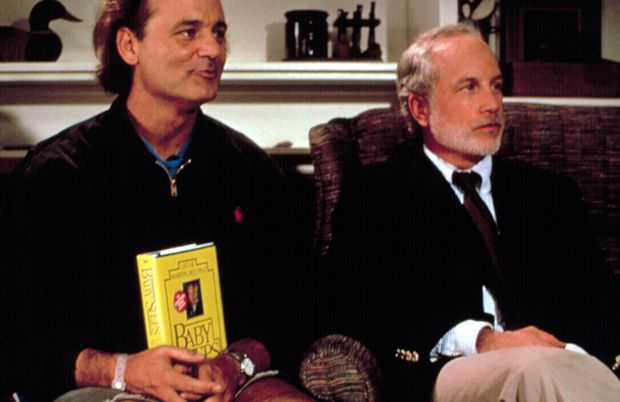
Bill Murray and Richard Dreyfuss in 1991’s “What About Bob?”
Touchstone Pictures/Courtesy Everett Collection
Baby steps?
Yes. The bond market wants the Federal Reserve to follow in the footsteps of Bill Murray’s character in the 1991 cult comedy “What About Bob?” now that a potential vaccine for COVID-19 looks more promising.
That means not wanting the Fed to do anything rash when it comes to ending its historic foray into buying up corporate debt.
Shares of downtrodden companies in the travel, airline and entertainment sectors soared Monday, amid promising developments on the COVID-19 vaccine front, while similar parts of the speculative-grade, or “junk bond” market also rallied.
The entertainment segment of the ICE BofA US High Yield Index outperformed, advancing 7.4%, according to Marty Fridson, chief investment officer at Lehmann Livian Fridson Advisors. The 10-year Treasury yield TMUBMUSD10Y, 0.918% jumped 13.6 basis points Monday to an 8-month high of 0.957% as haven government debt sold off, while the Dow Jones Industrial Average DJIA, +2.94% rose 3%, booking its best daily percentage gain since June.
Still, bond market professionals worried about what comes next.
“Now I can see an end to this whole thing,” said Jack Janasiewicz, a portfolio manager at Natixis Advisors, of the pandemic, after BioNTech BNTX, +13.91% and Pfizer Inc. PFE, +7.69% on Monday said their COVID-19 vaccine candidate was 90% effective in a late-stage trial, higher than the 60% threshold that was anticipated.
But Janasiewicz also expects the U.S. economy, businesses and workers to still need a “bridge” between now and whenever an effective vaccine can be created, distributed and administered — and when people feel comfortable resuming some semblance of normal life.
“What I hope will happen,” he said, is that the Congress will provide additional fiscal stimulus and the Fed will use its forward guidance to signal “a baby steps” approach to its eventual withdrawal from the corporate bond market.
“I think the risk is that you start pulling that support too soon,” he said.
Read: Why investors should ‘let dust settle’ after stock market soars on Pfizer vaccine news
The Fed established its raft of rescue lending facilities in March to help keep credit flowing during the pandemic, including an up-to-$750 billion program to buy debt in the $10.5 trillion U.S. corporate bond market, for the first time in history.
The pace of its corporate debt-buying recently slowed to about $50 million worth of daily purchases, as U.S. credit markets roared back with the help of the central bank’s backstop, said Gautam Khanna, senior portfolio manager at Insight Investment.
Ford Motor Co. F, +5.26% on Monday was able to borrow $2.5 billion in the “junk-bond” market at a yield of 4% for 10 years, or dramatically lower than the 9.6% yield it paid investors in April to borrow for a decade when markets still were in crisis mode. Ford did not immediately respond to a request for comment.
“The mere fact that these facilities exist helps the psychology of investors and frees their minds to take a bit of risk, which in turn helps with market liquidity and enables issuers like Ford to borrow,” Khanna said.
The Fed’s corporate credit lending program is slated to expire on Dec. 31, along with other portions of its sweeping pandemic relief programs.
Kathy Jones, chief fixed income strategist at the Schwab Center for Financial Research, sees the Fed ultimately extending its lending programs.
But she also sees potential complications getting that done after last week’s U.S. elections, including as President-elect Joe Biden begins to consider who could fill his cabinet, including the role of Treasury secretary, a position that in the past required close coordination with the Fed on its emergency loan facilities.
President Donald Trump has not yet conceded the race. In addition to political risk, it also means a delay of the formal beginning of the transition process, potentially denying Biden critical time and nearly $10 million in funding to get his administration up and running.
“You have a lot of different things going on,” Jones said, adding that as U.S. COVID-19 cases have surged above 10 million that the Fed’s credit facilities could continue to provide an important insurance policy to keep credit from freezing up again.
“They aren’t necessary right now,” said Nichole Hammond, senior portfolio manager at Angel Oak Capital, of the Fed’s rescue programs, pointing to the highly liquid primary market for new speculative-grade companies to borrow at historically low rates.
Although, now that the Fed has overcome the initial hurdles of creating and implementing its corporate credit facilities, she thinks they can be a crutch to pick back up in the future.
“Even if they don’t extend, we believe it would be relatively easy for the Fed to reactivate the programs if necessary based on their willingness and ability to bring back tools used during the financial crisis,” she said.










Add Comment